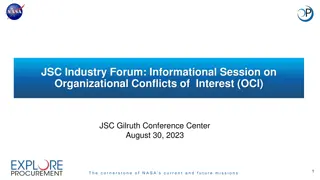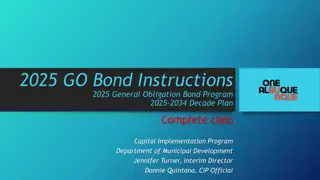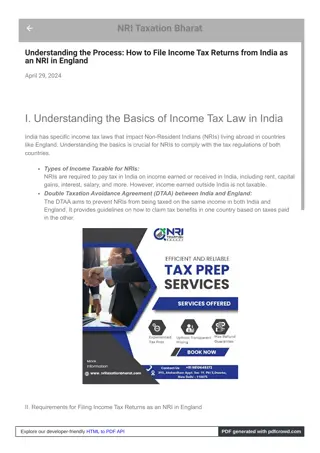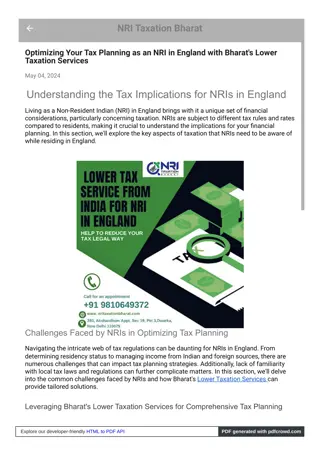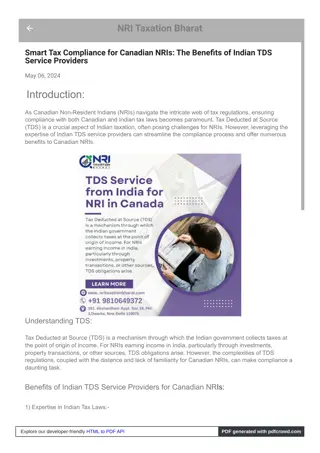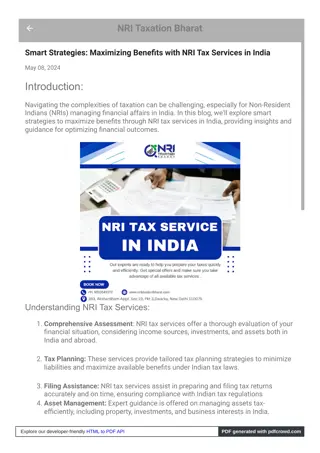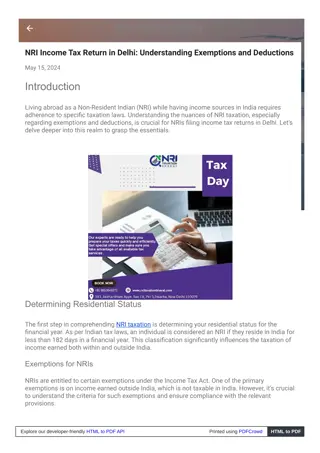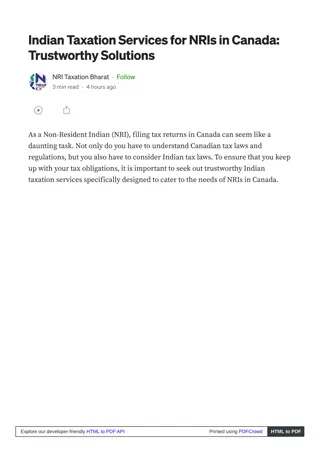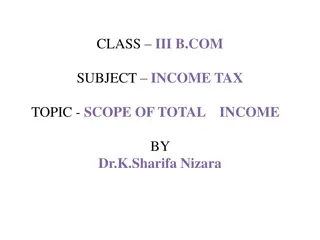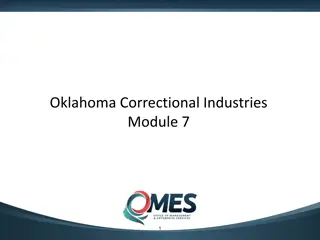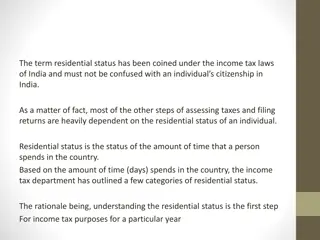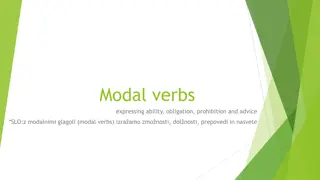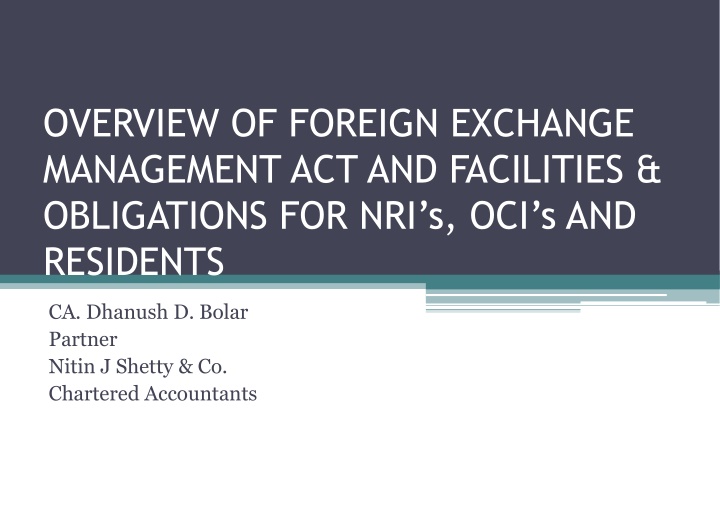
Key Insights into Foreign Exchange Management Act & Obligations for NRIs and OCIs
Explore the overview of the Foreign Exchange Management Act, covering objectives, structures, policy instruments, and obligations for residents, NRIs, and OCIs. Learn about FEMA's provisions on current and capital account transactions, liberalized remittance definitions, properties transactions, and more.
Download Presentation

Please find below an Image/Link to download the presentation.
The content on the website is provided AS IS for your information and personal use only. It may not be sold, licensed, or shared on other websites without obtaining consent from the author. If you encounter any issues during the download, it is possible that the publisher has removed the file from their server.
You are allowed to download the files provided on this website for personal or commercial use, subject to the condition that they are used lawfully. All files are the property of their respective owners.
The content on the website is provided AS IS for your information and personal use only. It may not be sold, licensed, or shared on other websites without obtaining consent from the author.
E N D
Presentation Transcript
OVERVIEW OF FOREIGN EXCHANGE MANAGEMENT ACT AND FACILITIES & OBLIGATIONS FOR NRI s, OCI s AND RESIDENTS CA. Dhanush D. Bolar Partner Nitin J Shetty & Co. Chartered Accountants
Topics to be covered Objective of FEMA Structure of FEMA Person resident in India and Person resident outside India. Current Account and Capital Account transactions, Liberalised Remittance definitions. Obligations for Emigrating Indians and returning NRI s Purchase and sale of properties in India by NRI/COI Lending and borrowing by & from NRI s/OCI s Scheme and other
Statement of Objects An Act to consolidate and amend the law relating to foreign exchange with the objective of facilitating external trade and payments and for promoting the orderly development and maintenance of market in India foreign exchange
Structure of FEMA FEMA has 49 sections of which 9 (section 1 to 9) are substantive and the rest are procedural/ administrative Sec 37A power to seize value equivalent Indian assets for overseas assets viz., foreign exchange, foreign security, immovable property suspected to have been held outside India held in contravention of Sec 4 Section 46 of FEMA grants power to Central Government to make rules to carry out the provision of FEMA Section 47 of FEMA grants power to RBI to make regulations to implement its provisions and the rules made there under RBI is entrusted with the administration and implementation of FEMA 4
Policy instruments of FEMA FEM ACT NOTIFICATIONS RULES MASTER DIRECTIONS A.P. DIR CIRCULARS FAQs FDI Policy 5
STRUCTURE OF FOREIGN EXCHANGE MANAGEMENT ACT, 1999
Chapter Chapter Title Subject Sections I Preliminary Jurisdiction, Definition 1-2 II Regulation & Management of forex Restriction on manner and dealing with PROI Holding of forex, foreign security & Immovable property Current A/c Transactions Capital Account Transactions Export of goods & Services Realization and Repatriation of forex with exemptions 3-9 III Authorized Persons Provisions relating to Authorized persons 10-12 IV Contravention and Penalties Provisions relating to contraventions, its consequences and compounding 13-15 V Adjudication and Appeal Provisions relating to terms of service, composition, appointment of adjudicating authority, members to Appellate Tribunal Provisions relating to Appeal to Special Director (Appeals), Appellate Tribunal and High Court 16-35 VI Enforcement Directorate Provisions relating to Appointment & Powers (*37A*) 36-38 VII Miscellaneous Management culpability; power to make rules and regulations, etc 39-49
Notifications under FEMA RBI had initially issued 25 notifications, covering capital account transaction prescribed in Sec 6(3) & certain miscellaneous provisions 15 related to capital account transactions, 1 on Export of goods and services and 9 for other regulations Since original notifications have undergone many changes, RBI has started revising the notifications and till date has issued 15 revised notifications [3(R), 5(R), 6(R), 7(R), 9(R), 10(R), 11(R), 12(R), 13(R), 14(R), 15(R), 18(R), 21(R), 22(R) and 23(R)] carrying suffix (R) for easy identification along with the year in which they are published. https://www.rbi.org.in/scripts/NotificationUser.aspx 8
Master Directions RBI has come up with Master Directions covering foreign exchange transactions. Master Directions consolidate regulations on the related subject. Master Directions are updated as and when there is change in rules/regulations or change in policy. Erstwhile Master Circulars thus have been withdrawn with issue of Master Directions. Till date, 20Master Directions have been issued by RBI. For example, master direction on export and import, master direction on external commercial borrowing, master direction on compounding of contravention etc. https://www.rbi.org.in/Scripts/BS_ViewMasterDirections.a spx 9 instructions rules and
A.P. (Dir Series) Circulars Authorised Persons Directions issued by RBI u/s. 10(4) and 11(1)of FEMA to Authorized Persons (AP) These directions are called A.P. (Dir Series) Circulars APs are Authorized Dealers, Money Changers and who are authorized to deal in Foreign Exchange These Circulars are operational instructions to AP by RBI banks 1 0
CONCEPT OF RESIDENCE Section 2(v)
Residential Status under FEMA Under FEM Act residential status is of two types: Person resident in India Person resident outside India Under FERA, citizenship was considered as deciding factor FEMA lays emphasis on permanency 'residing' which denotes The definition of Resident residential status of students going abroad for education. is silent regarding the
Residential Status under FEMA PERSON RESIDENT IN INDIA [Sec. 2(v)(i) of FEMA]: Person resident in India" means (i) A person residing in India for > 182 days during preceding F.Y. but doesn t include (A) A person who has gone out of India or stays outside India for taking up employment for carrying business or vocation for any other purpose in such circumstances as would indicate his intention to stay outside India for uncertain period (B) A person who has come to India or stays in India, in either case, otherwise than for taking up employment for carrying business or vocation for any other purpose in such circumstances as would indicate his intention to stay in India for uncertain period PERSON RESIDENT OUTSIDE INDIA[Sec. 2(w) of FEMA]: a person who is not resident in India.
Three interpretation of the definition First: A person is resident in India only if he stay in India is exceeding 182 days during the preceding FY. This is logically incorrect.
Second interpretation (a) For person leaving India - if he leaves India for any of the three purposes he is not a resident in India from Day 1 . If he leaves India for any of the other purposes, then he is resident in India only if his stay exceeds 182 days during the preceding FY. (b) For person coming to India - if he comes to India for any of the 3 purposes, then he is resident from Day 1. If he comes to India for any of the other purposes, then he is a nonresident irrespective of his period of stay in India during the preceding FY
Third interpretation (a) For person leaving India - if he leaves India for any of the three purposes, he is not a resident in India from Day 1 . If he leaves India for any of the other purposes, then he is resident in India only if his stay exceeds 182 days during the preceding FY. (b) For person coming to India - if he comes to India for any of the 3 purposes, then he is resident from Day 1. If he comes to India for any of the other purposes, then he is a resident in India only if his stay in India exceeds 182 days during the preceding FY.
Analysis of Definition Unlike Income tax, wherein residential status of a person is determined only on the basis of physical stay in India, under FEMA, it is the intention of leaving India or coming to India determines the residential status However, definition does refer to physical stay in India. The better view however should be Intention prevails over Physical Stay .
Example A person comes to India for taking a job on 1st May 2024. Under FEMA he becomes a resident from the day he comes to India. As a resident he can do several transactions. But as a non-resident, there will be restrictions. If such a person had to wait till 31st March 2025 to know whether he is a resident or vice-versa, there will be difficulties. Therefore, under FEMA, a person s residence is from a particular date. Under Income-tax the residential status is for a full year. This a fundamental difference between residential status as per Income Tax Act and FEMA. A foreigner comes to India for tourism. He falls ill and has to stay longer. This results in his stay exceeding 182 days in a year. Such a person will become a resident under the ITA. The person has not come for undertaking employment or business in India. Nor does it amount to a situation where his stay in India is uncertain. He will go back once he is better. Under FEMA, such a person will be a non-resident.
The term uncertain period is not defined in the Act. The term can be understood with reference to a case laws R.P.Verma vs Union (1999) 97CC 66 Delhi: AIR 1999 Del 53 Writ petition was filed by the appellant seeking direction that he should be treated as NRI for a limited purpose of holding assets in UK of his relative. Appellant was citizen of India and has to go abroad to look after his ailing relative. Date of return was not known at the time of his departure from India. His intention was to return to India only after the ailing relative recovered
His contention was that had gone to stay outside India for uncertain period and therefore he was not Person resident in India as per FERA. It was held that this fact was not sufficient to indicate his intention to stay outside India for uncertain period. It was also held that period for which VISA was issued t him was also not relevant in this context.
Reference to FEMA Notification emphasizing Intention Para 7 of Schedule 1 of FEMA Notification No. 5(R) Deposit regulations NRE accounts should be re-designated as resident accounts or funds held may be transferred to RFCAccounts immediately upon return to India for taking up employment or for carrying on business or for any other purpose indicating intention to stay in India .. Above para does give an indication that physical stay is not the guiding factor. Visit to India- Same para states- where a/c holder is on a short visit to India the a/c may continue as NRE even during his stay in India.
Residential Status under FEMA Indian Students Studying Abroad Mr. A had resident in India until the financial year 2023-24. He left India on 1st January 2024 for United States for higher studies for 3 years. What would be his residential status?
RBI Clarrification A.P. (DIR Series) Circular No. 45dated December 8, 2003 While taking up studies, students may have to take up job or seek scholarships to supplement their income. As a result their stay gets prolonged than what is intended while leaving India. They are not dependent for a dominant part of their expenses on remittances from their households in India. Hence, their stay will be for more than 182 days and intention will also be to stay outside India for uncertain period. Thus they can be treated as Non Resident Indians (NRI).
Accounts for Indian Students Studying Abroad Regulation 5(F)(6) of FEMA Notification No. 10R Indian students studying abroad may open, hold and maintain foreign currency account with bank outside India during their stay outside India. On return to India, after completion of studies, such an account will deemed to have been opened under the Liberalized Remittance Scheme
Physical Stay should be relevant only for acquisition of Immovable Property by Foreign Nationals other than OCI Press Release of Ministry of Finance dated 1stFebruary 2009 Government s advice on acquiring land by persons resident outside India In case of foreign nationals, condition of physical stay for more than 182days is mandatory for buying of Immovable Property as Resident. Along with period of stay intention also needs to be established. Travel related documents and nature of Visa can establish intention of a person.
DEFINITION OF NON-RESIDENT INDIAN(NRI) NRI or Non-resident Indian means individual resident outside India who is a citizen of India. NRI s are the citizen of India, however, PIO and OCI are not the citizen of India. Constitution of India does not allow the dual citizenship. However, to give benefit similar to dual citizenship, the concept of PIO card and OCI card was introduced in the year 2002 and 2005 respectively. Government of India has merged both cards through Citizenship Amendment Act 2015 in OCI cardholder.
Resident but Not Permanently Resident under FEMA: Explanation to Schedule III of Current A/c Rules For a very limited purpose, there is a concept of Not Permanently Resident (NPR). NPR mean a person resident in India on account of his employment or deputation of a specified duration (irrespective of length thereof) or for a specific job or assignment, the duration of which does not exceed 3 years, is considered to be a person resident but not permanently resident in India.
This is more in nature of facility available. Being resident but not permanently resident in India means a person is resident of India. Even his bank account is Resident account. Such person who is not permanently resident may purchase a foreign security from out of his foreign currency resources outside India [Reg 4(c) of FEMA 120] Relaxed remittance facilities as stated above will apply to (i) citizen of foreign state other than Pakistan and (ii) even to Indian citizen who is on deputation to the office or branch or subsidiary or joint venture of foreign company- Para 3.2 of MD- Other Remittance Facilities.
Under Regulation 4 of Possession and Retention of Foreign Currency Notification No. 9(R) dated 29.12.2015), a RNPR can hold foreign currency notes in India without any limit if the same was acquired while the person was a non-resident. Normally an Indian resident can hold foreign currency upto US$ 2,000 (subject to conditions). regulations (FEMA An NPR can also remit his net salary abroad after payment of taxes, contribution to provident fund, etc.
CAPITAL ACCOUNT TRANSACTION AND CURRENT ACCOUNT TRANSACTION For both capital and current account transaction, it is important to understand the i) Definition provided under FEMA ii) What is the characteristics of the transaction? iii)Whether the transaction is allowed to be undertaken?
Section 2(e) Capital Account Transaction Means a transaction which alters the assets or liabilities, including contingent liabilities, outside India of persons resident in India or assets or liabilities in India of persons resident outside India, and includes transactions referred to in sub- section (3) of section 6.
Analysis of the definition The term alter is not clearly defined in the Act. Only contingent liability is included and not contingent assets. Important aspect: i) The residence of person effecting the transaction ii) Creation of or change in the value of asset or liability because of the transaction. iii)The place where the asset is held or situated, or the liability incurred.
Relevant regulation: Foreign Exchange Management (permissible capital account transactions) Regulations, 2000 FEMA Notification 1. Prohibition: Regulation 4 No person resident outside India shall make investment in India , in any form, in any company or partnership firm or proprietary concern or any entity, whether incorporated or not, which is engaged or proposes to engage - (i) in the business of chit fund, or (ii) as Nidhi Company , or (iii) in agricultural or plantation activities or (iv) in real estate business, or construction of farmhouses or (v) in trading in Transferable Development Rights (TDRs).
For the purpose of this regulation, real estate business shall not include townships, construction of residential /commercial premises, roads or bridges and Real Estate Investment Trusts (REITs)registered and regulated under the SEBI (REITs) Regulations 2014. development of The Registrar of Chits or an officer authorised by the state Government in consultation with the State Government concerned, permit any chit fund to accept subscription from Non-resident Indians. Non-resident Indians shall be eligible to subscribe, through banking channel and on non-repatriation basis, to such chit funds, without limit subject to the conditions stipulated by the Reserve Bank of India from time to time this behalf, may, in
Schedule I For Person resident in India Particulars Relevant Rules or regulation Investment by a person resident in India in foreign securities FEM (Overseas Investment) rules, 2022 FEM (Overseas Investment) Regulation, 2022 (Notification dtd 22-08-2022) Foreign currency loans raised in India and abroad by a person resident in India FEM (Borrowing and Lending) Regulations, 2018 [Notification No. FEMA 3(R)/2018-RB] Transfer of Immovable property outside India by a person Resident in India FEM (Overseas Investment) rules, 2022 Guarantees Issued by a person resident in India in favour of a person resident outside India FEM (Guarantees) Regulations, 2000 [Notification No. FEMA 8/2000-RB] Export, import and holding of currency/ currency notes FEM (Possession and Retention of Foreign currency) Regulations, 2015 [Notification No. 11(R)/2015-RB] FEM (Export and Import of Currency) Regulations, 2015 [Notification No. FEMA 6(R)/2015-RB]
Schedule I For Person resident in India Particulars Relevant Notification Loans and Overdrafts (borrowings) by a person resident in India from a person resident outside India FEM (Borrowing and Lending) Regulations, 2018 [Notification No. FEMA 3(R)/2018-RB] Maintenance of foreign currency accounts in India and outside India by a person resident in India FEM (Foreign currency Accounts by a person Resident in India) Regulations, 2015 [Notification No. FEMA 10(R)/2015-RB] Taking out of Insurance policy by a person resident in India from an Insurance company outside India FEM (Insurance) Regulations, 2015 [Notification No. FEMA 12(R)/2015-RB] Loans and overdrafts by a person resident in India to a person resident outside India. FEM (Borrowing and Lending) Regulations, 2018 [Notification No. FEMA 3(R)/2018-RB] Remittance outside India of capital assets of a person resident in India FEM (Remittance of Assets) Regulations, 2016 [Notification No. FEMA 13(R)/2016-RB] Undertake Derivative contracts FEM (Foreign Exchange Derivative contracts) Regulations, 2000 [Notification No. FEMA 25/2000-RB]
Schedule II For Person resident outside India Particulars Relevant Notification Investment in India by a person resident outside India, that is to say, a) Issue of Security by a body corporate or an entity in India and Investment therein by a person resident outside India; b) Investment by way of contribution by a person resident outside India to the Capital of a firm or a proprietorship concern or an association of persons in India. FEM (Non Debt Instruments) Rules, 2019 Acquisition and transfer of immovable property in India by a person resident outside India FEM (Non Debt Instruments) Rules, 2019 Guarantee by a person resident outside India in favour of, or on behalf of, a person resident in India FEM (Guarantee) Regulations, 2000 [Notification No. FEMA 8/2000-RB]
Schedule II For Person resident outside India Particulars Relevant Notification Import and Export of Currency/ currency notes into/from India by a person resident outside India FEM (Possession and Retention of Foreign currency) Regulations, 2015 [Notification No. 11(R)/2015-RB] FEM (Export and Import of Currency) Regulations, 2015 [Notification No. FEMA 6(R)/2015-RB] Deposits between a person resident in India and a person resident outside India FEM (Deposits) Regulations, 2016 [Notification No. FEMA 5(R)/2016-RB] Foreign Currency accounts in India of a person resident outside India FEM (Deposits) Regulations, 2016 [Notification No. FEMA 5(R)/2016-RB] Remittance outside India of capital assets in India of a person resident outside India FEM (Remittance of Assets) Regulations, 2016 [Notification No. FEMA 13(R)/2016-RB] Undertake Derivative contracts FEM (Foreign Exchange Derivative contracts) Regulations, 2000 [Notification No. FEMA 25/2000-RB]
Section 2(j): Current Account Transaction Means a transaction other than a capital account transaction and without prejudice to the generality of the foregoing such transaction includes, - (i) payments due in connection with foreign trade, other current business, services, and short - term banking and credit facilities in the ordinary course of business, (ii) payments due as interest on loans and as net income from investments, (iii) remittances for living expenses of parents, spouse and children residing abroad, and (iv) expenses in connection with foreign travel, education and medical care of parents, spouse and children
For example, Resident of India imports goods from outside India on a credit basis say 6 months, he is creating a liability outside India and thus, it can be treated as capital account transaction, but it is specifically included in the above definition, therefore it shall be treated as a current account transaction.
Relevant rules: Foreign Exchange Management (Current Account transaction) Rules 2000.
Current Account Transactions are divided into 3 schedules Schedule I read with Rule 3: Transaction which are prohibited. Schedule II read with Rule 4: Transaction with the prior approval of government of India. Schedule III read with Rule 5: Transaction for which prior approval of RBI is required if the amount exceeds the specified limit.
Schedule I - Transactions which are prohibited 1. 2. Remittance of income from racing/riding, etc. or any other hobby. 3. Remittance for purchase of lottery tickets, banned/ prescribed magazines, football pools, sweepstakes, etc. 4. Payments of commission on exports made towards equity investment in joint ventures/wholly owned subsidiaries abroad of Indian companies. 5. Remittance of dividend by any company to which the requirement of dividend balancing is applicable. (Not effective at present) 6. Payment of commission of exports under Rupee State Credit Route, except commission up to 10% of invoice value of exports of tea and tobacco. (Not effective at present) 7. Payment related to "Call Back Services" of telephones. 8. Remittance of interest income on funds held in Non-Resident Special Rupee (Account) Scheme. Remittance out of lottery winnings.
Schedule II Transaction with the prior approval of government of India Purpose of Remittance Ministry/Department of Government of India whose approval is required Cultural Tours Ministry of Human Resource Development (Department of Education and Culture) Advertisement in foreign print media for the purposes other than promotion of tourism, foreign investments, and international bidding (exceeding US$ 10,000) by a State Government and its Public Sector Undertakings. Ministry of Finance, Department of Economic Affairs Remittance of Freight of vessel chartered by a PSU Ministry of Shipping Transport, (Chartering Wing) Payment of import through ocean transport by a Government Department or a PSU on c.i.f. basis (i.e., other than f.o.b. and f.a.s. basis) Ministry of Shipping Transport, (Chartering Wing) Multi-modal transport operators making remittance to their agents abroad Registration Certificate from the Director General of Shipping
Schedule II Transaction with the prior approval of government of India Purpose of Remittance Ministry/Department of Government of India whose approval is required Remittance of hiring charges of transponders by TV Channels and Internet Service Providers Ministry of Information and Broadcasting Remittance of container detention charges exceeding the rate prescribed by Director General of Shipping Ministry of Surface Transport Remittance of prize money/sponsorship of sports activity abroad by a person other than International/National/State Level sports bodies, if the amount involved exceeds US$ 1,00,000 Ministry of Human Resource Development, (Department of Youth Affairs and Sports) Remittance for membership of P&I Club (It is a club know as Protection and Indemnity Club which provides Protection and Indemnity Insurance) Ministry of Finance (Insurance Division )
Schedule III : Liberalised Remittance Scheme Resident Individuals can avail of foreign exchange facility for the current account transactions and permissible transaction within the limit of USD 2,50,000 in a financial year. Any additional remittance in excess of the said limit for the following purposes shall require prior approval of the Reserve Bank of India. capital account
(i) Private visits to any country (except Nepal and Bhutan). (ii) Gift or donation. (iii) Going abroad for employment. (iv) Emigration. (v) Maintenance of close relatives abroad. (vi) Travel for business or attending a conference or specialised training or for meeting expenses for meeting medical expenses, or check-up abroad, or for accompanying as attendant to a patient going abroad for medical treatment/ check-up. (vii) Expenses in connection with medical treatment abroad. (viii) Studies abroad. (ix) Any other current account transaction.
Provided that for the purposes mentioned at item numbers (iv), (vii) and (viii), the individual may avail of exchange facility for an amount in excess of the limit prescribed under the Remittance Scheme as provided in regulation 4 to FEMA Notification 1/2000-RB, dated the 3rd May, 2000(here in after referred to as the said Liberalised Remittance Scheme) if it is so required by a country of emigration, medical institute offering treatment or the university. Liberalised
The permissible capital account transactions by an individual under LRS are: a) Opening of foreign currency account abroad with a bank; b) Purchase of property abroad; c) Overseas Direct Investment/Overseas Portfolio Investment outside India d) extending loans including loans in Indian Rupees to Non-resident Indians (NRIs) who are relatives as defined in Companies Act, 2013. (Loan in foreign exchange is not expressly provided in ECB regulations therefore not permissible)

